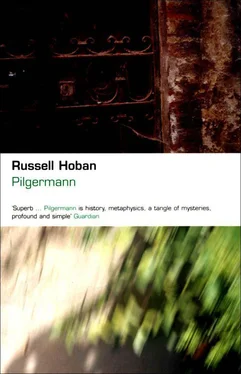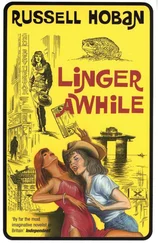Russell Hoban - Pilgermann
Здесь есть возможность читать онлайн «Russell Hoban - Pilgermann» весь текст электронной книги совершенно бесплатно (целиком полную версию без сокращений). В некоторых случаях можно слушать аудио, скачать через торрент в формате fb2 и присутствует краткое содержание. Год выпуска: 2002, Издательство: Bloomsbury Publishing PLC, Жанр: Современная проза, на английском языке. Описание произведения, (предисловие) а так же отзывы посетителей доступны на портале библиотеки ЛибКат.
- Название:Pilgermann
- Автор:
- Издательство:Bloomsbury Publishing PLC
- Жанр:
- Год:2002
- ISBN:нет данных
- Рейтинг книги:5 / 5. Голосов: 1
-
Избранное:Добавить в избранное
- Отзывы:
-
Ваша оценка:
- 100
- 1
- 2
- 3
- 4
- 5
Pilgermann: краткое содержание, описание и аннотация
Предлагаем к чтению аннотацию, описание, краткое содержание или предисловие (зависит от того, что написал сам автор книги «Pilgermann»). Если вы не нашли необходимую информацию о книге — напишите в комментариях, мы постараемся отыскать её.
Pilgermann — читать онлайн бесплатно полную книгу (весь текст) целиком
Ниже представлен текст книги, разбитый по страницам. Система сохранения места последней прочитанной страницы, позволяет с удобством читать онлайн бесплатно книгу «Pilgermann», без необходимости каждый раз заново искать на чём Вы остановились. Поставьте закладку, и сможете в любой момент перейти на страницу, на которой закончили чтение.
Интервал:
Закладка:
Both the Nagid and the Rabbi, being classified as dhimmis, beneficiaries of Muslim hospitality, wore yellow turbans and belts and were not allowed to ride horses or carry weapons. Perhaps because I was already castrated I found this further diminution galling. I had not so far flouted the law by carrying weapons or riding a horse but I had not put on a yellow belt and turban. In my mind I tried to, but could not, put into words my reasons for not wanting to be welcomed into a community of yellow turbans. Nor would I ever again be a member of any congregation other than that vast and erring one called the human race.
‘Matters between God and me have gone beyond synagogues and congregations,’ I said to the Rabbi and the Nagid. ‘I have no prayers.’
‘It’s not as if you can pass for a Muslim by denying us,’ said the Rabbi; ‘you will simply be known as the eunuch Jew who does not wear the yellow belt and turban.’
‘So be it,’ I said.
Soon after Chanukah came the First Muharram, the new Muslim year, the Hijra year 490. On the Tenth Muharram Bembel Rudzuk fasted. ‘Not everyone fasts on this day which is akin to your Day of Atonement,’ he said. ‘And of course there are those who on this day pitch black tents and mourn the death of Husain at Kerbela. I am not devout in the usual sense of the word but I find that fasting refreshes my attention; so I do it because my attention is always flagging and there are times when I fail to see the she-camel.’
‘Tell me about this she-camel,’ I said.
‘In the Quran we read of a people called the Thamud,’ said Bembel Rudzuk. ‘They dwelt in rocky places, they had their dwellings in the rock. There came to them a prophet, his name was Salih. He told the Thamud that he was bringing to them the Word of God but they asked him for proof. Salih then called upon Allah and there appeared from out of the solid rock a she-camel, pregnant.
‘This she-camel was an exemplary camel; she grazed and she found her way to water and in this way she showed that God’s gifts are meant for all of God’s creatures, that pasturage and water should not be held fast by the rich and kept from the poor, they should be freely shared.’
‘What happened with this camel?’ I said.
‘Those people of the rocks, those hard and stony people, Salih told them that the eye of God was upon them; he told them to be hospitable to the stranger-camel, to let it graze where it liked and not to withhold water from it. They laughed at him, the Thamud, and after the camel had given birth they hamstrung both the mother and the foal. They killed the camel and her child and they dared Salih to call down punishment upon them.
‘“Go to your houses,” he told them. “You have three days in which to prepare yourselves.” After three days the earth shook, thunderbolts crashed down among those people, the ground opened up, the rocks melted and ran down into the abyss, the people were annihilated; the Thamud people were no more.
Those foolish Thamud people are often referred to in the Quran and thus are we reminded that not only is every she-camel the she-camel of God, but every other animal and all of us as well, we are all creatures of God. In every configuration of time and circumstance there is the she-camel of the matter to be discerned by those whose attention is strong and constant. All of us dwell in the stone and when the stone brings forth a she-camel we must take notice of it and respond appropriately. But it is so easy to see only the stone and not the camel; I am always afraid that I shall fail to see that she-camel of God.’
All through the rains there was no word from Tower Gate. ‘Is he going to make the tiles or not?’ I said to Bembel Rudzuk.
‘I think he’s going to do it,’ said Bembel Rudzuk: ‘he hasn’t said no.’
Passover that year came at the end of March. The day before the Eve of Passover Jews were to be seen selling their leaven to Muslims, and this little act of accommodation touched me. See, I thought, everyone does not wish us dead! and my eyes filled with tears. I remembered the Gentiles buying the leaven of the Jews in my town, the town of my boyhood and my young manhood, the town where I had climbed the ladder to Sophia. So far away it was already in space and time!
On Passover Eve when Jews were reading the Haggadah at the Seder, when the door was left open and a cup of wine was poured for Elijah, I walked in the rain to Bembel Rudzuk’s empty stone square. Freed from the traditional observance of the festival my mind widened into the rain, into the night, widened across the space of time to Pharaoh’s Egypt, to the killing of the lamb without blemish, to the dipping of the hyssop in the blood, to the striking of the lintel and the sideposts with the blood, to the passing of dread wings in the night and the smiting of the first-born of Egypt, both man and beast. Ah, God! I thought, when will you learn! Why must your arm be stretched out against anyone? Why must you choose us to be yours and to be punished for ever by you and by the world? Then I remembered that God was no longer He. Perhaps as It he remembered nothing, perhaps like blind Samson he simply felt for the pillars and put forth his strength against them.
And then, thinking those heavy thoughts in the rainy night I found myself laughing because it suddenly came to me that it was not only Passover for the Jews but Easter for the Christians; Christ having been crucified at Passover the two moon-coupled festivals were for all time chained together. In Antioch that night the Christians would be reciting the eternal crime of the Jews and worshipping their tortured Jew on his cross while that same cross in cloth of scarlet was moving eastwards on the shoulders of the Franks. While the Jewish doors of Antioch stood open for Elijah. When God was He there was nobody like Him for jokes.
Spring came, the Franks arrived in Constantinople and the price of a bale of silk went up by three dinars in Tripoli. ‘As when the leaves of the olive trees show their undersides before the rain comes,’ said Bembel Rudzuk. ‘These Franks inspire uncertainty, everyone is wondering what will happen next. Some think that fewer ships and caravans will be arriving and everything will be in short supply.’
The weather grew fine, the wooden rod at the centre of the square cast a strong young shadow. My original chalk drawing and the drawing made by the speechless boy had both been washed away by the winter rains; the empty stone presented itself to the eye as if for the first time and the sun shone down as if there would never again be cold and wet, there would only be hot and dry. With the passing of days there began to arrive donkey-loads and camel-loads of triangular tiles, as startling in their actuality as Silpius, red and black and tawny as I had seen them in my mind. With the tiles there arrived workmen who unloaded the camels and the donkeys, sorted the tiles according to size and colour, stacked them on the paving stones, and began to mix mortar.
In my hand was the wooden compass with which I had made my first drawing, and now I opened it once more to the radius that would summon to the surface of the stone that same circle I had first drawn in the darkness.
I removed the rod, inserted the plug, placed the compass foot, and then it was as if the chalk line moved the outer compass leg before it as it closed itself into a circle. Again I developed the flower of six petals, and line by line out of it grew the hexagons and triangles of Hidden Lion.
It was then that there appeared a fully armed man walking across the paved square towards us. ‘This man,’ said Bembel Rudzuk, ‘is Firouz. He used to be a Christian, now he is a Muslim. He is an emir and he is close to our governor, Yaghi-Siyan. The Tower of the Two Sisters is under his command and two other towers as well.’
Читать дальшеИнтервал:
Закладка:
Похожие книги на «Pilgermann»
Представляем Вашему вниманию похожие книги на «Pilgermann» списком для выбора. Мы отобрали схожую по названию и смыслу литературу в надежде предоставить читателям больше вариантов отыскать новые, интересные, ещё непрочитанные произведения.
Обсуждение, отзывы о книге «Pilgermann» и просто собственные мнения читателей. Оставьте ваши комментарии, напишите, что Вы думаете о произведении, его смысле или главных героях. Укажите что конкретно понравилось, а что нет, и почему Вы так считаете.












